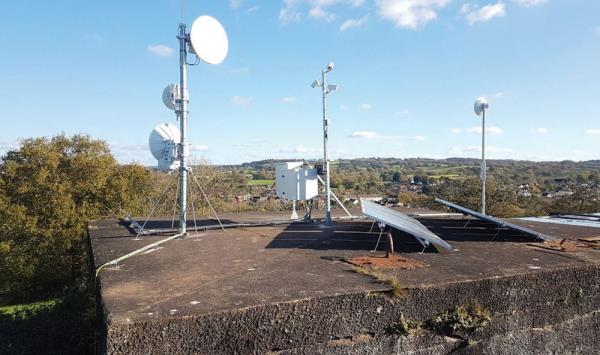07 March 2018

Some of the relay equipment that rural community broadband specialist Voneus sometimes has to install on farms or commercial buildings.
The Government has said it has achieved its manifesto promise of extending superfast broadband to 95 per cent of the country by the end of 2017.
Citing figures published by thinkbroadband.com, it said more than 19 out of 20 homes and businesses now have the opportunity to upgrade their internet connections to speeds of 24Mbps or faster – that’s more than double Ofcom’s recommendation for a typical family home.
In an announcement made at the end of January, the Department for Digital, Culture, Media and Sport said the £1.7bn superfast broadband rollout had so far reached more than 4.5 million premises, mainly in rural areas. It claimed the programme had created around 50,000 new local jobs and generated an additional £8.9bn in turnover in the areas covered between 2013 and 2016.
In total, around 800,000 homes and businesses were reached last year through the BDUK programme alongside commercial delivery with Openreach, the government’s major partner. As a result, the 95 per cent target was achieved in December 2017. DCMS secretary Matt Hancock said: “We’re reaching thousands more premises every single week, and the next commitment is to making affordable, reliable, high speed broadband [10Mbps or faster] a legal right to everyone by 2020.”
Meanwhile, Rachel Neaman, CEO of not-for-profit organisation Corsham Institute, pointed out that bridging the ‘digital divide’ goes beyond internet access. “We have known for a long time that many people still lack the basic digital skills and support networks to make the most of online opportunities. The pace of tech-driven change is now creating a further challenge if we want everyone, no matter where they live, to work and thrive in our digital world throughout their lives.”
Neaman said she wanted businesses and policymakers to provide more teaching, training and support for workers. She added that it’s also time for a greater focus on digital education and social media awareness in schools.
Thinkbroadband.com editor Andrew Ferguson also said that not everyone was celebrating the government’s achievement, referring to the 1.4 million premises that make up the five per cent still struggling with no speed option above 24Mbps.
“Although rural areas make up a large portion of the five per cent, there are many areas within major cities also struggling with broadband speeds. Ironically, Westminster is one of those areas which finds itself behind the curve, alongside areas of Manchester, Liverpool, Bangor, Glasgow and Belfast. Clearly more needs to be done to ensure no premises are left behind as we continue on the road to a superfast Britain.”
One company that is helping to connect Britain’s ‘not spots’ is rural community broadband specialist Voneus. Earlier this year, it was granted powers by Ofcom under the Electronics Communications Code that will help it accelerate the rollout of superfast services to hard-to-reach communities.
“There are numerous rural communities across the UK that are still struggling to get access to superfast broadband; many are stuck on lengthy waiting lists, in the hope that broadband will eventually reach their neighbourhoods,” said Alan Seldon, customer services director, Voneus. “These Code Powers will cut the wait for the communities we serve. They make it simpler for us to expand our infrastructure into new places, meaning we can more quickly bring superfast broadband to more homes and businesses.”
Voneus claims it uses innovative solutions where alternative services may not be available. The firm reckons it can install broadband quickly and cost effectively, while delivering speeds of between 35Mbps and 50Mbps using ‘Wireless FTTH’ solutions that include the installation of an antenna to the customer’s premises and a dedicated router.
Separately, Voneus has also partnered with Gigaclear to speed up the adoption of ultrafast broadband in rural areas. Under the agreement, Voneus will offer residential and business customers a wide range of broadband services over Gigaclear’s fibre network, with the ability to deliver ultrafast speeds of up to 1Gbps. For Gigaclear, the partnership will enable it to expand its existing ultrafast FTTH network of more than 200 communities across 20 counties.
Another company that is working to connect rural areas is Worcester-based ISP Airband. It recently announced that the first customer on the Connecting Shropshire project has gone live. The initiative is part of the government’s superfast broadband rollout and is supported by the Marches Local Enterprise Partnership which has an £11.2m contract to connect more than 14,000 local premises by 2020.
Airband project manager Dave Lloyd said: “The project will be going live in five phases. Phase 1 is due to complete in the spring and involves 28 transmitter sites. During this period, Airband will be making superfast broadband available to 7,000 homes. Further areas will be going live incrementally as the network is created.”
The ISP’s deployment of fixed wireless broadband works by sending a radio signal from a transmitter site to a small receiver attached to the customer’s property. A cable is then run into the building allowing the end-user to access the internet in the same way as any other broadband connection.
Airband’s first customers went live just a few weeks after the launch of its first transmitter site which serves more than 300 homes and businesses. The transmitter provides 30Mbps connectivity to parts of Sheriffhales and Shifnal parishes as well as other communities further east.










